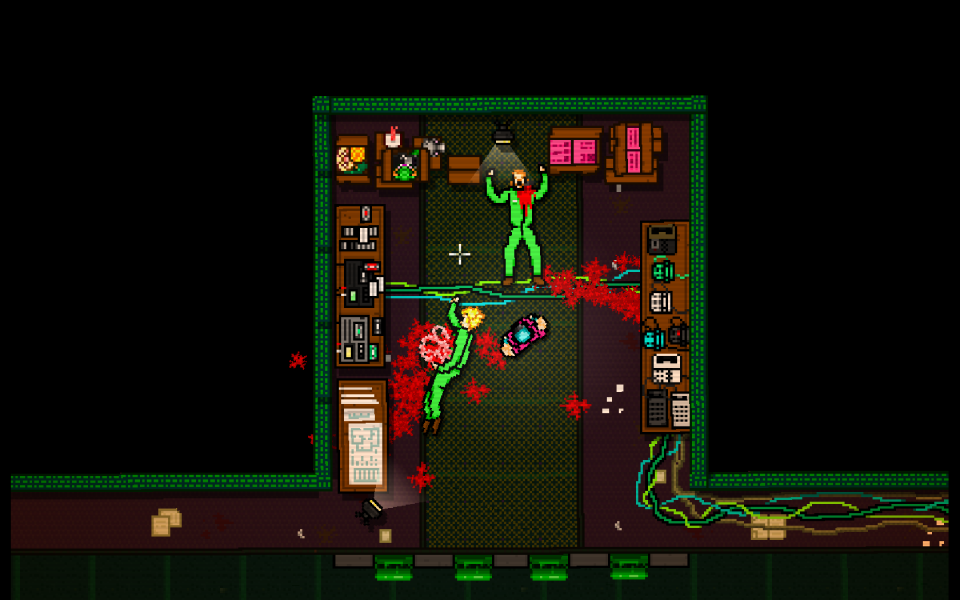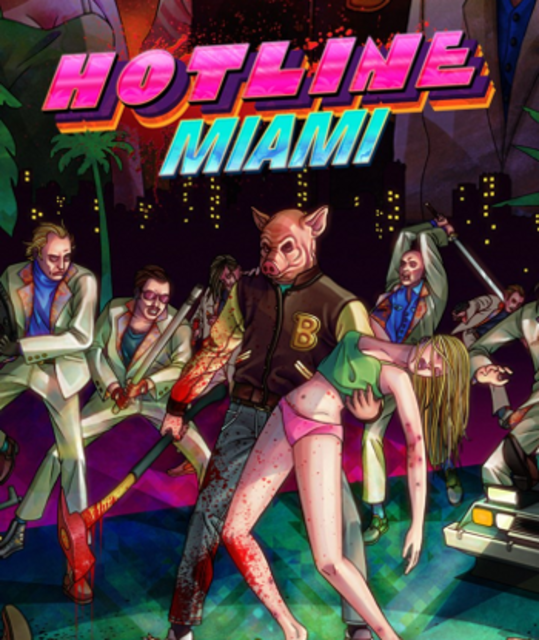I'm sorry this one's taken so long. Between picking up more work and school kicking into high gear, I really haven't had the time. Because it's now been more than a month since the launch of the game, I figure most of you have already finished and seen the "true ending" so I'll just be talking about it as if you already know instead of explaining as I go like in the last couple parts.
Facelessness encourages the player to project himself onto the character
One of the things that works really well in Hotline Miami is how quickly you (the player) slip into "being" the character. I mentioned this in Part 2 a little, noting that silent protagonists always encourage player projection. As soon as a character opens his mouth, he becomes his own character. Mass Effect did this with Shepard. Though the player had a huge amount of choice of how Shepard would react, his words were his own. This essentially puts Nolan North between the player and his/her character.
Yet another example of how the late-80s art style works, the fact that you never see your own face thanks to the top-down point-of-view also encourages this player projection.
Although the protagonist certainly seems to have his own vibe, the player is left to interpret his actions and rationalize them in a way that makes sense to him. Why does he rescue the girl? Why does he live in such a grungy apartment? What did he do for a living before he killed people? All these things are up to you, and you're very likely to play them close to the heart, even if only out of habit.
This is interesting in itself, but nothing new. What is new is how this applies to the violence of the game. It seems you leave a bloody trail wherever you walk, and until you get used to that, it is a little unnerving. That squeamish feeling is brought on by this projection of the self onto the character. The slimmer that disconnect, the easier it is to feel how the character feels.
Drugs are all around but nobody's using them
Miami in the late 80s was a blow-fuelled gangland, and it's no coincidence this game happens to take place exactly then. Throughout the game, you see a lot of needles and mysterious white powders, but you never actually see any characters using them actively. This may just be because of the minimalist storytelling style, but it also elegantly implies something else: that everyone is using them.
The breakneck pace of the game backs this up, as well as the AI. The game tells you "Tip: Enemies are predictable" in the loading screen. Alex's review mentions this: though the AI is simple, the speed of the game gives it a very humanly dynamic feel. What this all amounts to is the semblance of a bunch of heavily-armed men all acting entirely on visceral instinct. The flashing background and constantly-rotating screen tell you one thing: you're probably the most coked-up of everyone.
By doing it this way, Dennaton has simultaneously kept the focus off the drugs, and pulled no punches by hiding them in plain sight.
Nationalists

Early on in the game, you're told you're fighting the Russian Mafia. The classic boogeyman of the 80s makes perfect sense for this game. When the ending reveals that the people behind the phone calls are trying to affect how the country goes by killing of foreigners, it's hardly a surprise.
When you take a step back from the game though, you see some political commentary: the boogeyman has changed, but the attitude hasn't. Shooting Russians in the 80s was the status quo for most action films from the West, from James Bond to Bruce Willis. Take a look at what we're shooting in modern action films and games: Arabs. Recent Call of Duty games have mostly been set in the Middle East, as have more thoughtful (though not necessarily any less violent) games like Spec Ops: The Line.
It's important to remember that this game was made in Sweden, not in the States. Meta-analysis always has a different flavour than analysis coming from somewhere else, and Hotline really hits the nail on the head for having been developed outside the continent.
One neat loose end left in the game is the implication that you haven't stopped the movement, even if you killed the two people behind the calls. When you're abducted to the dirty apartment, there are three people in masks talking to you. Though you kill two people at the underground phone centre, there's still a third one out there somewhere. And that's assuming those two were two of the masked abductors: there could be even more of them.
Games as art
I wrote to Jonatan, one of the two guys behind the game, and he told me "Joining a studio sounds like it would mean giving up some of my creative freedom, which I don't want to do." If you've played any of his earlier games (he's also well known as "Cactus" or "Cactusquid" and has been making small games, quietly releasing them for years, and has built a small but loyal following) you'll know some of them can be quite abstract. Hotline Miami is first a piece of art and a game second. Every piece is integral to every other piece, and it all fits together so nicely it's hard to imagine it any other way.

Log in to comment